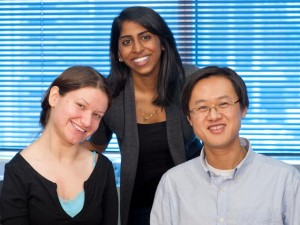
Cristina Thomas (top) with her mentors in the Woodruff Lab, Candace Tingen, PhD, and Min Xu, PhD.
Cristina Thomas is like many young students at Northwestern University. She spends her time studying, participating in school activities, and having fun with her friends. In addition to all this, over the past four years she has worked in the laboratory of Teresa K. Woodruff, PhD, on a variety of projects dealing with ovarian follicle development. A few weeks ago, all the hard work paid off when Cristina was awarded the Constance L. Campbell Award, one of just a few prestigious awards given to graduating biology students at Northwestern.
In her research, Cristina investigated some factors that may aid in the development of future fertility techniques for cancer patients, such as in vitro follicle growth. Specifically she examined how different oxygen concentrations and the presence of theca cells or macrophages (white blood cells) may increase the growth and survival of follicles. Some of this work was recently published in the journal Reproduction in a paper titled, “A macrophage and theca cell-enriched stromal cell population influences growth and survival of immature murine follicles in vitro,” by Tingen et al.
In addition to investigating new techniques, Cristina also worked with researchers to determine whether existing fertility preservation techniques are appropriate for specific cancer patients. She and a medical fellow examined the number of antral (more mature) follicles in ovaries from 140 patients with ovarian cancer and correlated those follicle numbers with the severity of the ovarian masses. These results may affect the fertility preservation treatments offered to ovarian cancer patients in the future and can guide development of additional oncofertility techniques.
A gender studies minor, Cristina also enthusiastically participated in the Oncofertility Saturday Academy, where she organized fellow undergraduate students to mentor younger girls in the Chicago program. These undergraduates provided advice on the college application process and gave the high school students a tour of Northwestern’s campus.
Cristina will continue to employ her research and oncofertility expertise as she enters the next phase of her life, as a medical student at Northwestern’s Feinberg School of Medicine. She is only one example of how the Oncofertility Consortium is training the next generation of medical specialists in the principles of oncofertility.

